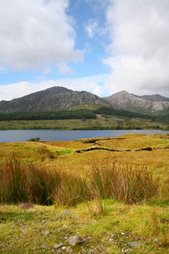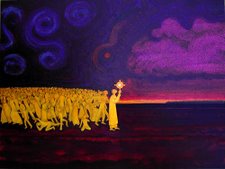
[Picture: John McManus - PictureOurLand Irish Photos]
Listen to this when you get a chance and you have time to absorb it. [click on the post heading above]
John Moriarty's "Invoking Ireland":
'Invoking Ireland is a miscellany of parables and aphorisms by which, as individuals, and not as a herd, we might find a way of living authentically on this island ... Moriarty writes a prose poetry in whose doorways we can discern the shades of William Yeats and Dylan Thomas, David Jones and Jack Yeats. Who else but Moriarty could combine in his palette the voices of Blathmac and Traherne? Moriarty's conversation is a dialogue between Christianity and pre-Celtic Ireland. If there is a saving evolutionary, environmental moment, it is what the painters of the Renaissance saw: that when, in Gethsemane, the disciples fall asleep, Christ stays awake. Invoking Ireland is an elucidation of Patrick Kavanagh's prayer: "We must be nothing/Nothing that God may make us something." Strange to surmise that in twenty years from now ... one will see in tcd under the severe, genial eye of Bishop Berkeley the new John Moriarty Chair of Wisdom Literature.'
- Paul Durcan, The Irish Times
'Moriarty's work is written with a glorious innocence and a knowing wisdom, ranging between superb storytelling and rhetorical flourishes, and it would be my dream that everyone would read this book, take its truths to heart, and take from Irish society the harshness of the legacy we are currently bequeathing to a sorry future.'
- John F. Deane, Irish Independent
'Invoking Ireland is a collection of commentaries on various folktales and mythic stories which have had relevance for Irish people over the centuries É It is a whirlwind of powerful imaginative prose. Moriarty is a writer who, over a number of significant works, has been trying to tell us that we are capable of being awake in a deeper, more visceral and more potent way than merely by thinking thoughts. As we gaze into the misty realms of Irish mythology, he wants to undress our mind of its reason, and plunge it into a sense of being which transcends ego-ic parameters. He wants us to share his exploration of Irish myth at this deep psychological level, so that we can find new meaning in the old stories, and so that the old stories can bring a new perception to the way we live out our lives. And he succeeds so well that something new emerges. The thin line between commentary and creative expression vanishes, and the pages of this book deliver up extraordinary poetic thought.'
- Michael Harding, The Sunday Tribune
Invoking Ireland takes us on a "safari of stories" around Irish mythology, and Moriarty recreates them in a way that we have never experienced them before. There is an attempt here to prod us into feeling what it was like when Aimhairghin and his pards sailed up the Kerry shore. The original old or middle Irish poetry and tales, he quotes accurately. His translations are new and pristine and inventive. They are the kind that scholars should do if they entered into the spirit of their literature. Because it is the spirit that always inspires him, and the wrestling to make imaginative sense of what our country has said. We meet Manann‡n, Crom Dubh and Lugh, Christ, the Buddha and D.H. Lawrence. Dylan Thomas and Orpheus and Ted Hughes light our path or lead us into the sidings. This is a wild shaggy-haired ride along the mountains of the moon, it is a Catherine wheel of imagery, it is a great belch of the goodness of life. Moriarty's Birdreign will never come about because we can never fly with feathered wings. We are the metallic Iron people clomping around the earth that he rails about. Life may refuse definition, but we are busy building the stockades around us. What he does magnificently is, however, to reach out and touch what it must have been like before tame philosophy, before plodding discourse, before our teeming brains straightened themselves out. This book can only be read as mythic poetry with all its beauty and with all its roughness and with all its artlessness. It is not a book to be compromised with. It can only be embraced with fervour.'
- Alan Titley, The Irish Book Review
'The Ireland offered here is at once an image which subsists behind its physical appearances and an impress of all nations as inscribed in their key mythologies. Taking a line through Orphean legend, Hindu cosmology, Blake's Prophetic Books and Greek and Nordic mythology, Moriarty offers a reading of the great ongoing war between matter and spirit É In his view, that ancient Ireland of Spirit, coherent with Nature prior to its conquest by the "cormorant tongues" of "Fomorian" man is still, potentially, realizable. His quest, as an earlier poet put it - for Moriarty is as much poet as novelist - is to "feel back along the ancient lines of advance". But not only so. He would like to make us feel, and hear as we read, the rhythms of those ancient tongues. John Moriarty is, I believe, a genius. If our civilization manages to survive in a form which is still capable of recognizing genius when it is pushed under its nose, it is possible, in due course, that he will be acknowledged as such.'
- Robert Lumsden, Adelaide Review
-------------------------------------
I WENT out to the hazel wood,
Because a fire was in my head,
And cut and peeled a hazel wand,
And hooked a berry to a thread;
And when white moths were on the wing,
And moth-like stars were flickering out,
I dropped the berry in a stream
And caught a little silver trout.
When I had laid it on the floor
I went to blow the fire a-flame,
But something rustled on the floor,
And someone called me by my name:
It had become a glimmering girl
With apple blossom in her hair
Who called me by my name and ran
And faded through the brightening air.
Though I am old with wandering
Through hollow lands and hilly lands,
I will find out where she has gone,
And kiss her lips and take her hands;
And walk among long dappled grass,
And pluck till time and times are done,
The silver apples of the moon,
The golden apples of the sun.
WBYeats, "The Song of Wandering Aengus"



No comments:
Post a Comment